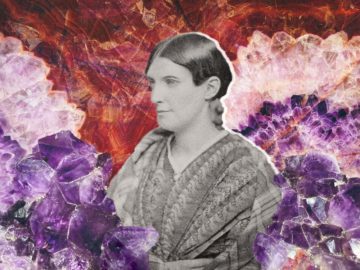Reed Gochberg in Smithsonian:
 On Christmas Day in 1839, 17-year-old Ellen Sewall received gifts from two suitors who happened, unfortunately, to be brothers. From John, she received a pale pink opal. From Henry, she received a collection of poems. Within a year, she had rejected both men’s offers of marriage—but she kept their gifts.
On Christmas Day in 1839, 17-year-old Ellen Sewall received gifts from two suitors who happened, unfortunately, to be brothers. From John, she received a pale pink opal. From Henry, she received a collection of poems. Within a year, she had rejected both men’s offers of marriage—but she kept their gifts.
Sewall (later Osgood) had crossed paths with the Thoreau brothers that summer while visiting her aunt in Concord, Massachusetts. She would remain friends with the younger sibling, Henry David Thoreau, for the rest of her life and the elder, John Thoreau Jr., until his sudden death three years later from tetanus. At some point around a decade after they first met, Henry, who would go on to become a Transcendentalist philosopher and the author of Walden, sent Osgood another gift: an intricately built box designed to hold rocks and minerals. Now housed at the Concord Museum, this box—and the collection of specimens within it—has long been classified as the property of Osgood’s husband, Joseph, a minister and education reformer. In truth, however, the collection belonged to Ellen. It was the product of her lifelong interest in geology and her friendship with the now-famous Henry.
More here.
